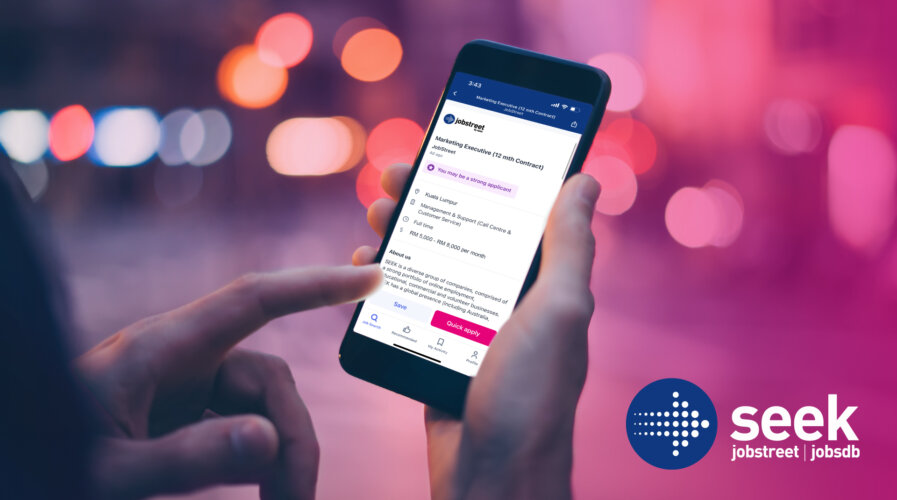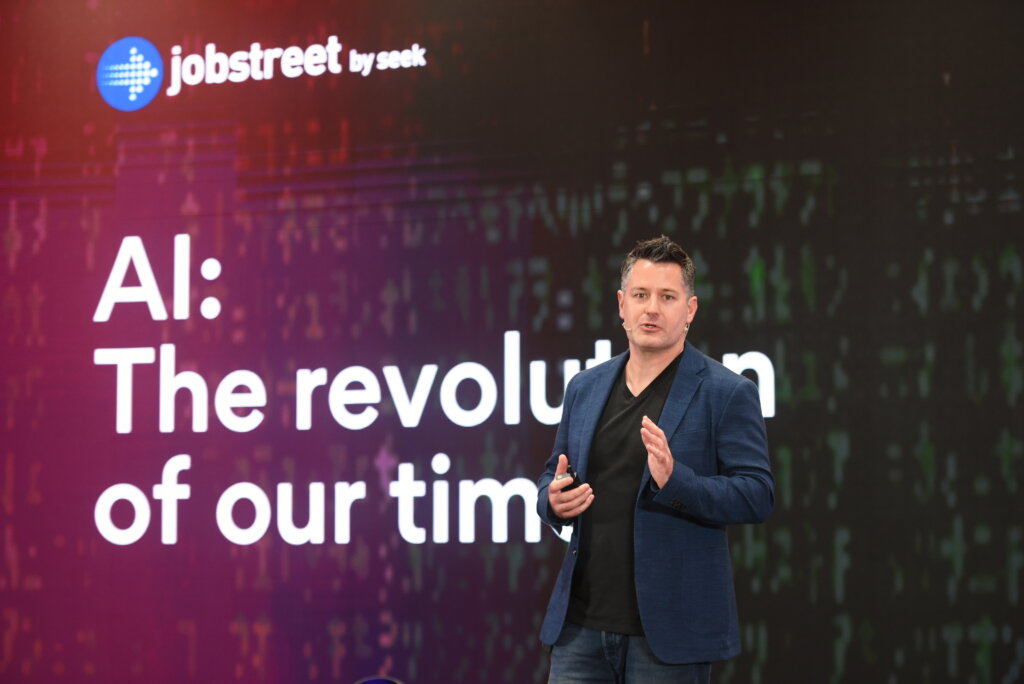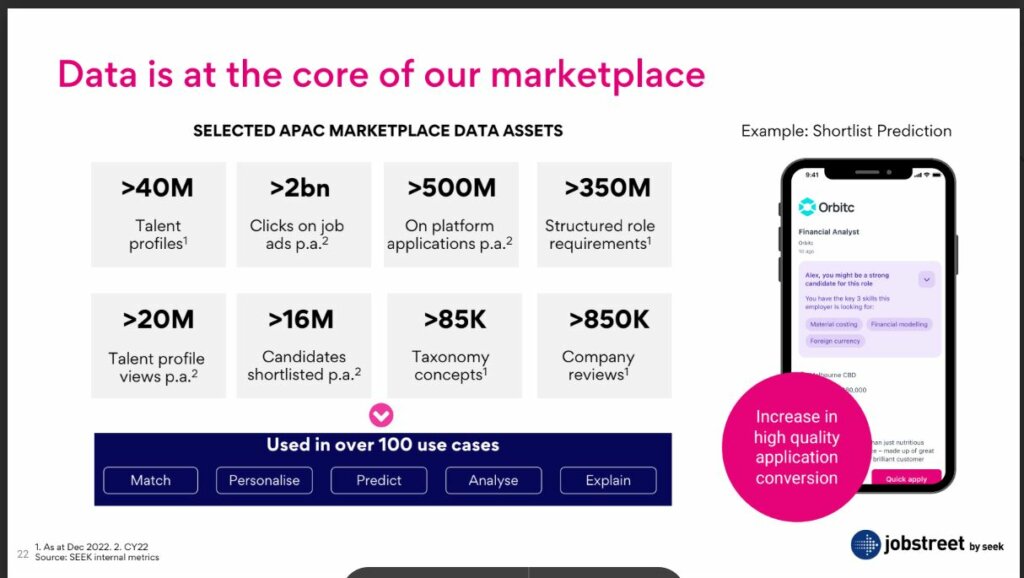
The job landscape in the Asia Pacific continues to evolve. (Image by SEEK).
Here’s how AI can help businesses and job seekers
- AI is expected to benefit job seekers and employers for recruitment.
- AI can be useful in shortcutting the job seeking process.
- SEEK has several AI features on its job platform.
When it comes to employment, job seekers and employers want a platform that can give them what they really need. For job seekers, it’s about finding a role that can meet their desired working experience while employers want a platform that can offer them the right types of candidates, without the need to browse through numerous job resumes.
Over the years, job platforms have continued to evolve to meet this need. Today, most employment marketplaces are utilizing emerging technologies to improve the entire recruitment experience. Given the advantages of generative AI, employers are also now capable of creating better descriptions for their roles as well.
In Asia Pacific, SEEK is a leading job platform. Having merged with Jobstreet and Jobsdb, the platform is now one of the largest employment marketplaces in the region. The integration has enabled the brand to bring together millions of talents and employers across the APAC region to accurately match jobseekers and employers.
The job landscape in the Asia Pacific continues to evolve. Roles are changing and companies are hungry to hire more talent. While some companies have leveraged recruiters, social media and even going straight to universities to hire talent, having a platform that can advertise a role that is appealing to jobseekers is still essential.
In fact, in countries like Malaysia, unemployment rates have returned to pre-pandemic levels of 3.3%. Following this positive growth, many organizations have shown difficulties in hiring talent across the country, among one of the reasons being talent or skills mismatch.
To address this gap, employers can now tap into a wider talent pool of over 40 million people across eight APAC markets, and talent can access more job opportunities from over 2.5 million employers – including more remote working opportunities. This aligns with a survey finding that revealed that 68% of talent are willing to work remotely for an employer that lacks a physical presence in their country. SEEK’s new features are particularly helpful for those recruiting talent based in other markets and for Malaysians who wish to explore employment opportunities in companies that are based overseas.
“As the leading job searching platform in Malaysia, and recently honored as the gold winner for e-commerce at the Putra Aria Brand Awards—a prestigious accolade determined by people’s choice—we are excited to facilitate more tailored job matches between employers and job seekers in the country. With the implementation of SEEK’s AI-powered solutions, Jobstreet can now help employers and talent in Malaysia find better matches more efficiently and navigate the job market more effectively,” says Vic Sithasanan, managing director, Malaysia, Jobstreet by SEEK.
Sithasan also pointed out that the average monthly job ab posting has increased by 163% compared to pre-pandemic levels. 95% of Malaysian employers also plan to increase or maintain their headcount of permanent employees.

Grant Wright, general manager of marketplace and AI products at SEEK.
AI for job seekers and employers
With AI being adapted into almost every use case today, it was only a matter of time before employment marketplaces started using them as well. Given the amount of data collected and stored in this field, creating AI algorithms that can cater to specific needs could revolutionize the entire recruitment experience.
According to Grant Wright, general manager of marketplace and AI products at SEEK, the new platform deploys AI models to assess talent suitability and provide highly personalized recommendations by processing data from various sources, including resumes, job ad descriptions and the employer’s past behaviors. This allows employers to have a more efficient hiring process. Employers can also expedite the talent shortlist process by adding AI-recommended screening questions in their job ads.
Specifically, Wright highlighted that employers could use the platform’s AI tools to improve job postings, especially on the details of a role and such. For job seekers, the AI algorithms on the platform are capable of making the job-hunting process more efficient and relevant. This is based on the AI-recommended jobs that match applications for roles they are most qualified for based on their experience and skills. Using AI, Jobstreet also predicts when a person is likely a strong candidate for a role by showing a top applicant badge, so talent can make more informed decisions whether to apply for a role.

SEEK’s data assets makes it easier for AI. (Image – SEEK).
Following the unification program, Jobstreet can now harness a larger dataset across APAC, which will empower its AI algorithms to provide even more precise and relevant matches between employers and talent. Ultimately, this translates into an elevated user experience and expedites the hiring process on its platform.
Another interesting feature is the natural language search on the platform. This innovation allows job seekers to submit job queries using simple phrases or complete sentences on the platform, so they do not need to rely solely on keyword phrases. Powered by a large language model (LLM), the feature enables a search experience that is more organic and appealing to job seekers. This feature has already launched in the Philippines and is set to roll out across the rest of SEEK’s APAC markets by 2024.
Wright also mentioned that false positives and false negatives are still being improved. This is because the AI model is still learning. Interestingly, Wright is confident that the data will only make AI better in the future.
On concerns about the tools being used for the wrong reasons, both Wright and Sithasanan explained that the platform has several verification tools that businesses are required to complete before posting roles. This also includes offshore roles and such.
Sithasanan did acknowledge that job scams continue to be a big problem in the industry but also highlighted that they often involve employment on social media apps. As such, he advised job seekers to be more vigilant in their job-seeking activities and only apply for jobs through legitimate platforms.
READ MORE
- Safer Automation: How Sophic and Firmus Succeeded in Malaysia with MDEC’s Support
- Privilege granted, not gained: Intelligent authorization for enhanced infrastructure productivity
- Low-Code produces the Proof-of-Possibilities
- New Wearables Enable Staff to Work Faster and Safer
- Experts weigh in on Oracle’s departure from adland


